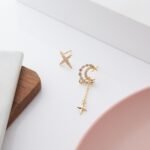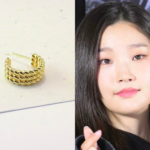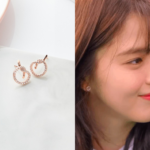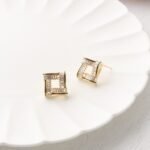50% OFF All Items | Free Shipping Over $35
Your Guide to Allergy-Resistant Earring Materials: Exploring 925 Silver, Medical Steel, Steel Pins, and Alloy Options
Explore allergy-resistant earring materials in this comprehensive guide. Discover the best choices among 925 silver, medical steel, steel pins, and alloys to prevent reactions. Make confident and worry-free earring selections with our expert advice.
You’ve finally pierced your ears and want to adorn them with beautiful earrings, but redness and itching follow suit. What type of earring material should you choose to avoid allergic reactions? This article introduces you to four common earring materials, provides four techniques to improve allergy situations, recommends earring styles suitable for allergy-prone individuals, reduces the probability of ear inflammation, and ensures worry-free earring purchases!
Earring Materials Overview: What materials are used in earrings? Introduction to 925 Silver, Medical Steel, Steel Pins, and Alloy Materials.
925 Pure Silver: Many accessories boast the use of ‘925 pure silver,’ indicating that the jewelry contains 92.5% silver, with the remaining 7.5% being alloy. This ratio not only represents the highest purity of silver jewelry but also prevents oxidation and deformation. Earrings made of 925 pure silver exhibit higher allergy resistance among all materials, making them ideal for those prone to ear sensitivity.
Medical Steel: Medical steel, also known as German steel or 316L medical steel, is widely used in medical instruments such as bone screws and orthodontic devices. Due to its frequent use in medical settings, medical steel ranks as the most allergy-resistant earring material. While the earpin of medical steel may be thicker than other materials, its round ball end and ‘locking’ design provide excellent stability. It’s recommended for first-time wearers to apply a bit of Vaseline on the earrings for easier insertion.
Reminder: For those newly wearing medical steel earrings, if you experience a warm sensation, it’s normal and won’t enlarge your ear holes. Additionally, the round ball lock design of medical steel earrings offers excellent fixation, reducing the chance of falling compared to regular pin-style earrings. The spherical design ensures comfort without causing discomfort to the ears.
Steel Pins: Steel pins are a commonly used earring material, offering a comfortable fit due to their thinner profile compared to medical steel. In terms of allergy resistance, they provide a better effect than alloys. However, personal body chemistry should still guide your choice, and it’s recommended to remove steel pin earrings before bathing or sleeping.
Alloy: Most earrings use alloy materials, combining various metals such as copper, zinc, nickel, etc., through surface electroplating to create different colors. Since alloy earrings are more affordable than 925 pure silver and offer a diverse range of styles, they have become the mainstream material for jewelry. However, due to the mixture of various metals, some components may trigger skin allergies. If you have sensitive skin, it’s advisable to avoid choosing alloy earrings.





